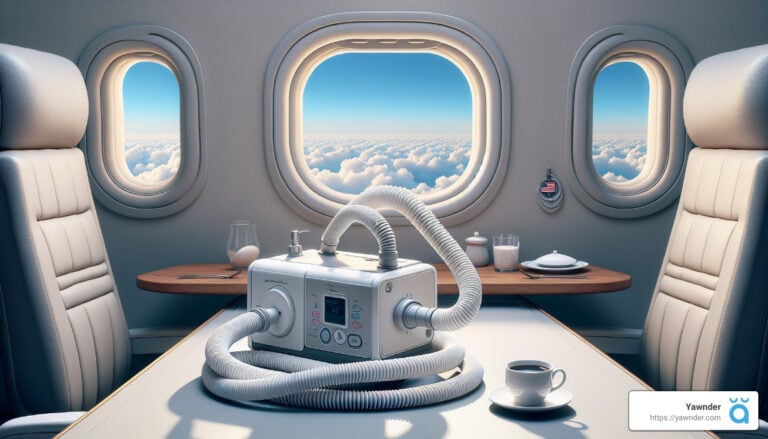The Easiest Way to Use Your CPAP on a Plane: Expert Tips for Stress-Free Travel
Traveling with your CPAP machine is not only possible; it’s essential for those who rely on it for a good night’s sleep. Here’s everything you need to know to ensure a smooth journey while keeping your sleep apnea treatment on track.
Understanding Your Rights When Traveling with a CPAP
When it comes to flying with a CPAP machine, understanding your rights and the relevant regulations is paramount.
Legal Rights Under the ADA
The Americans with Disabilities Act (ADA) protects your right to travel with necessary medical devices, including your CPAP machine. This ensures that airlines must accommodate you and your medical needs, making it clear that your CPAP device is protected under these regulations.
CPAP as a Medical Device
Your CPAP machine is classified as a medical device, which means it’s not counted toward your carry-on luggage allowance. This allows you to bring it onboard without any worries about exceeding limits. However, it’s advisable to inform the airline beforehand to avoid potential issues.
Airline-Specific Policies
Airlines have varying policies regarding CPAP machines. Here’s a quick overview:
– United Airlines: Requires 48 hours of advance notice to their Accessibility Desk. They will verify your device’s compliance with FAA regulations.
– Delta Airlines: Lists approved CPAP devices and requires that your backup battery have at least 150% of your flight duration.
– American Airlines: No advance notice is needed, but you cannot rely on onboard power outlets.
– JetBlue: Allows CPAP use as long as it complies with TSA and FAA regulations.
– Southwest Airlines: Encourages carrying your CPAP on board; however, power outlets may not be available.
It’s crucial to check with your airline at least 48 hours before departure to review their specific policies.
Preparing for Your Flight with Your CPAP
Preparation is key for a seamless travel experience. Here are strategies for packing and documenting your CPAP machine effectively.
Packing Your CPAP Machine
1. Carry-On Luggage: Keep your CPAP in your carry-on bag to avoid damage or loss.
2. Avoid Checked Bags: Never place your CPAP machine in checked luggage, as it can be mishandled.
3. Humidifier Maintenance: If your machine has a humidifier, empty the water chamber to prevent leaks.
4. Extra Supplies: Always bring spare tubing, filters, and a backup mask.
5. Clear Plastic Bags: Place smaller items in clear plastic bags to ease the TSA inspection process.
Important Documentation
1. TSA Guidelines: Familiarize yourself with TSA guidelines for medical devices. Your CPAP machine will require X-ray screening.
2. Medical Certificate: Have a medical certificate from your doctor to validate your need for the CPAP.
3. FAA Compliance Letter: Carry a FAA compliance letter for your device to avoid complications.
4. Airline Notification: Inform your airline of your need for a CPAP at least 48 hours before your flight.
5. Travel Clearance Form: Some airlines may require a travel clearance form; check in advance.
CPAP Setup and In-Flight Use
Using your CPAP on the plane is feasible and manageable with the right preparation.
Using Your CPAP on the Plane
Is CPAP Allowed on the Plane?
Absolutely! You can and should use your CPAP during your flight. Here’s how to ensure a smooth experience:
1. TSA Recommendations: Your CPAP must go through X-ray screening, so pack it in a clear plastic bag.
2. FAA Compliance: Most modern CPAP machines meet FAA regulations; carry your compliance letter.
3. Consider Travel-Sized Devices: Compact units like the ResMed AirMini are perfect for air travel as they eliminate the need for a water chamber.
Expert Tips for In-Flight Use
– Choose the Right Seat: Opt for a seat located near a power outlet, if possible. Websites like SeatGuru can help you locate power-friendly seating.
– Battery Packs: Reliable battery packs like the RPS II can power your CPAP throughout the flight, so make sure it’s fully charged before boarding.
– Extension Cords: Carry an extension cord in case the power outlet is not conveniently located.
– Stay Occupied: Bring reading material or entertainment to make your experience more enjoyable while using your CPAP.
Frequently Asked Questions about Traveling with CPAP
How can I sleep on a plane with sleep apnea?
Select a supportive neck pillow and try to secure a window seat for added comfort. Consider using a memory foam travel pillow for enhanced support.
Is my CPAP considered a carry-on?
No, it is not counted against your carry-on limit due to the ADA regulations.
Does flying worsen sleep apnea?
Yes, irregular flight schedules and cabin pressure changes may exacerbate symptoms of obstructive sleep apnea, so it’s critical to have your CPAP handy.
Conclusion: Traveling Smart with Your CPAP
Traveling with your CPAP machine doesn’t have to be daunting. With the right preparation, you can maintain your sleep hygiene and overall health during your journeys. At Yawnder, we’re here to provide a range of travel-friendly CPAP machines and accessories, making it easier to uphold your sleep apnea treatment no matter where you are.
Investing in a compact travel-sized CPAP machine like the ResMed AirMini will vastly improve your travel experience. Remember, staying well-rested is vital for your health, and maintaining your CPAP routine during travel ensures you enjoy your trip fully.
For additional information and options tailored for travel, check out our selection of CPAP machines and accessories today. Safe travels and restful nights await!

